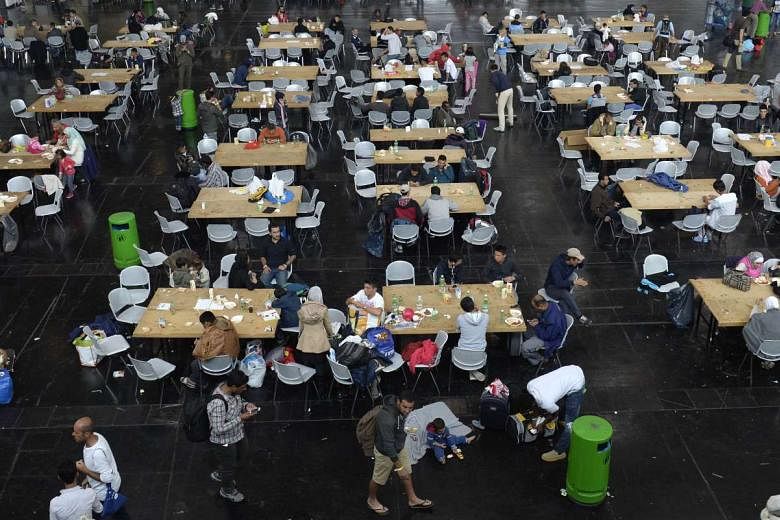MUNICH • Ms Rania Al-Hamawi had gone to sleep on Saturday on a cot alongside her three sons and another 1,700 people who had made the arduous journey to the Bavarian capital from Syria and other strife-ridden countries.
But when she woke up on Sunday, half the beds in the cavernous conference centre-turned-migration camp were empty.
Throughout the night and into the morning, a well-oiled German bureaucratic machine had been at work moving the new arrivals from Bavaria to cities across the country.
Over two days, nearly half of about 20,000 new arrivals had been moved on. Even some Germans have been surprised by the efficiency of the country's crisis management system and overall generosity. New arrivals were systematically given food, shelter and medical screening.
In many ways, Germany is a laboratory of how the European Union (EU) can jointly tackle the migrant crisis. Key to the seamless response has been a quota system that has been in place for decades and distributes migrants across the country's states according to their populations and economic prowess, much like the system Chancellor Angela Merkel has proposed for the 28 member states of the EU.
But if the German quota system highlights a possible path to a European solution, it is also laying bare the pitfalls along the way.
Like many other migrants waiting to find out where in Germany they will end up, Ms Al-Hamawi has a clear preference. She would like to stay in Munich, perhaps go to Frankfurt or Hamburg but not Dresden, known for its neo-nazi arson attacks on asylum homes.
"We fled war, we want peace," she said. "I just want my sons to study and get jobs."
It is those same concerns that may make a forced quota system across Europe difficult, if the EU members even agree to one.
So far, Germany has not had much success persuading its European partners to adopt a similar system.
Response to the proposal, and in many countries to the migrants themselves, ranges from outright hostility, like in Hungary and other parts of Eastern Europe, to a more polite but equally hardened insistence on the right to "opt out" of such quotas, as in Britain and Denmark.
The poorer Eastern European countries argue their societies cannot handle the burden of integrating thousands of largely Muslim refugees, and others insist that any system will just encourage more people to risk the hazardous trip to Europe.
Only those countries on the Mediterranean front line such as Italy and Greece, which have been struggling with the issue for years, and relatively open societies like Sweden, another popular migrant destination, have been willing to support Germany's efforts.
NEW YORK TIMES

